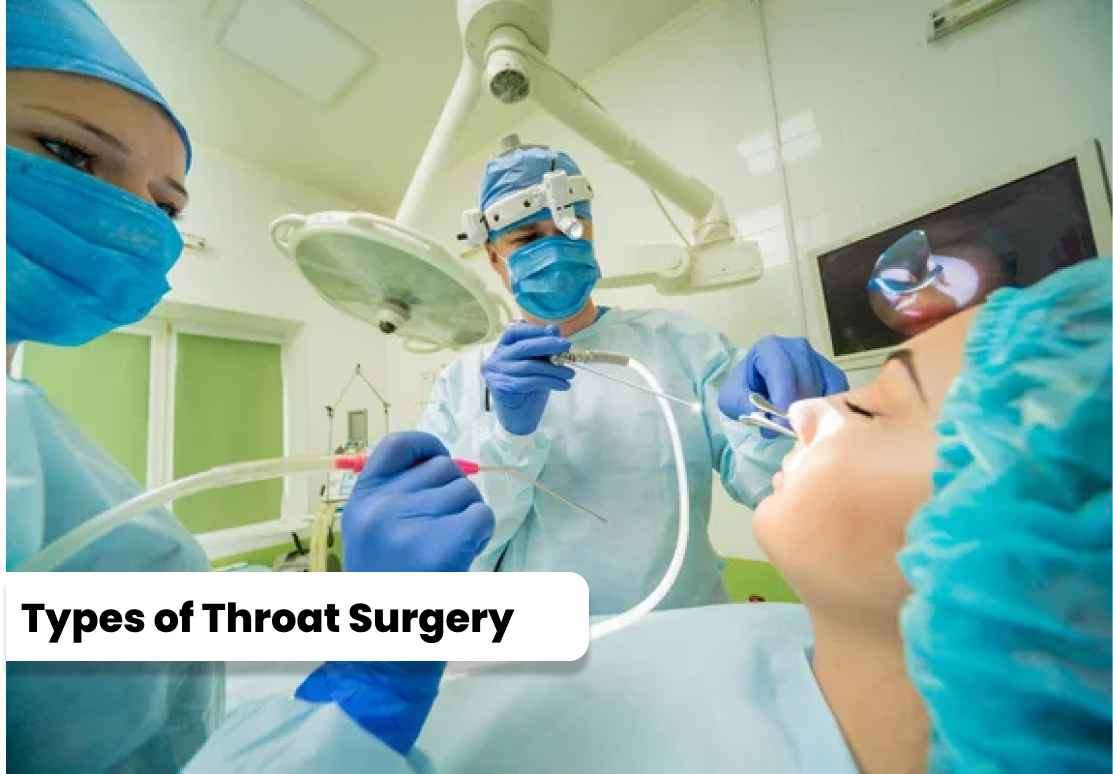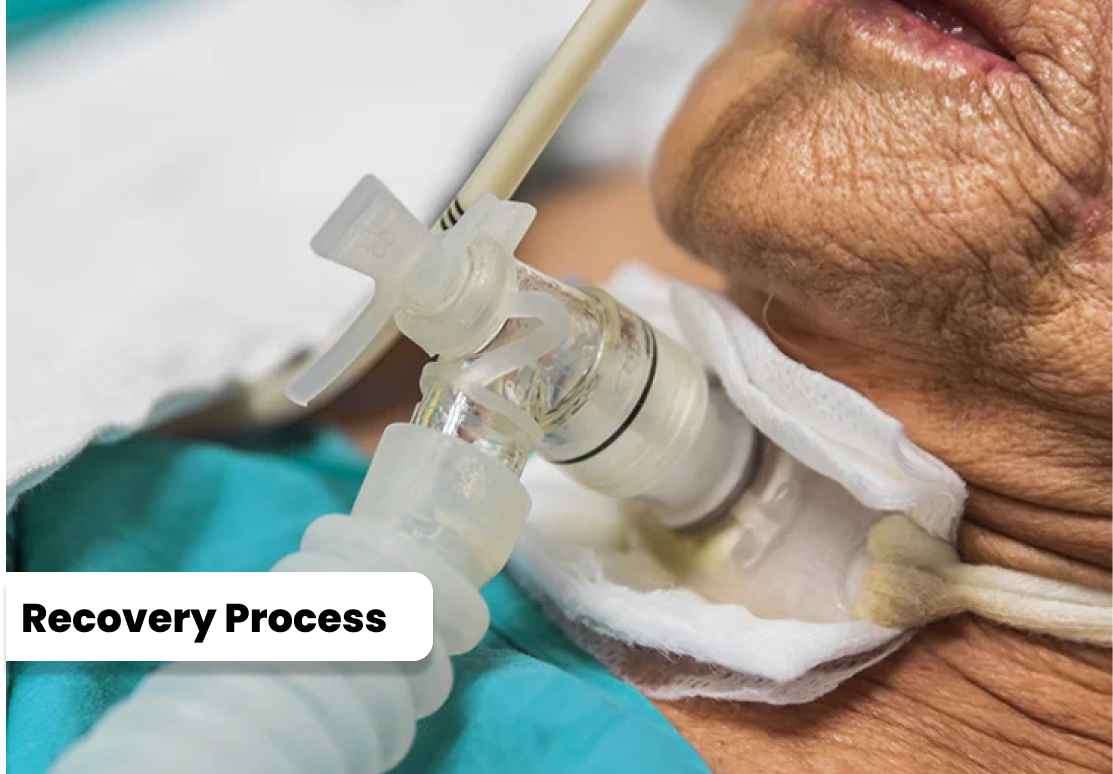Throat surgery, also known as laryngosurgery or pharyngeal surgery,
refers to a range of surgical procedures performed on the throat or
structures within the throat.
Call us to book an appointment with the best Otolaryngologist-Ear,
Nose, and Throat (ENT) specialist or a Sinus Surgeon near you.
Throat surgery, also known as laryngological surgery, encompasses a range of procedures that aim to address various conditions affecting the throat, larynx (voice box), and adjacent structures. These surgeries are performed by otolaryngologists, commonly known as ear, nose, and throat (ENT) specialists. Throat operation may be recommended for a variety of reasons, such as correcting structural abnormalities, managing voice disorders, or treating conditions that affect breathing and swallowing.

Throat surgery, also known as laryngological surgery, encompasses a range of procedures that aim to address various conditions affecting the throat, larynx (voice box), and adjacent structures. These surgeries are performed by otolaryngologists, commonly known as ear, nose, and throat (ENT) specialists. Throat operation may be recommended for a variety of reasons, such as correcting structural abnormalities, managing voice disorders, or treating conditions that affect breathing and swallowing.
1. Tonsillectomy (tonsil stone removal): Tonsillectomy is the surgery to remove tonsils. It is often performed to treat chronic tonsillitis, recurrent throat infections, or sleep-disordered breathing caused by enlarged tonsils. The procedure can alleviate symptoms such as sore throat, difficulty swallowing, and snoring.
2. Adenoidectomy: Adenoidectomy involves the removal of the adenoids, which are small glands located at the back of the nose. Adenoidectomy may be recommended to address chronic sinusitis, recurrent ear infections, or nasal obstruction caused by enlarged adenoids. 3. Vocal Cord Surgery: Vocal cord surgery aims to correct voice disorders caused by nodules, polyps, cysts, or other growths on the vocal cords. These abnormalities can affect voice quality, causing hoarseness or difficulty speaking. Surgical interventions may involve removing the growths or modifying the vocal cords to improve voice function. 4. Laryngectomy: Laryngectomy is a procedure that involves the partial or complete removal of the larynx. It is typically performed in cases of advanced laryngeal cancer. Following the surgery, alternative methods of speech, such as using an artificial larynx or learning esophageal speech, are taught to patients.
5. Thyroid Surgery: Although not strictly a throat surgery, thyroidectomy (removal of the thyroid gland) is performed in the neck region and can be mentioned in the context of throat surgery. It is commonly conducted to treat thyroid nodules, goiter, or thyroid cancer.

1. Tonsillectomy (tonsil stone removal): Tonsillectomy is the surgery to remove tonsils. It is often performed to treat chronic tonsillitis, recurrent throat infections, or sleep-disordered breathing caused by enlarged tonsils. The procedure can alleviate symptoms such as sore throat, difficulty swallowing, and snoring.
2. Adenoidectomy: Adenoidectomy involves the removal of the adenoids, which are small glands located at the back of the nose. Adenoidectomy may be recommended to address chronic sinusitis, recurrent ear infections, or nasal obstruction caused by enlarged adenoids.
3. Vocal Cord Surgery: Vocal cord surgery aims to correct voice disorders caused by nodules, polyps, cysts, or other growths on the vocal cords. These abnormalities can affect voice quality, causing hoarseness or difficulty speaking. Surgical interventions may involve removing the growths or modifying the vocal cords to improve voice function.
4. Laryngectomy: Laryngectomy is a procedure that involves the partial or complete removal of the larynx. It is typically performed in cases of advanced laryngeal cancer. Following the surgery, alternative methods of speech, such as using an artificial larynx or learning esophageal speech, are taught to patients.
5. Thyroid Surgery: Although not strictly a throat surgery, thyroidectomy (removal of the thyroid gland) is performed in the neck region and can be mentioned in the context of throat surgery. It is commonly conducted to treat thyroid nodules, goiter, or thyroid cancer.
Throat surgery offers numerous benefits for patients experiencing throat-related conditions. Some advantages include:
1. Symptom Relief: Surgery can alleviate symptoms associated with throat conditions, such as chronic sore throat, difficulty swallowing, voice changes, and breathing problems. 2. Improved Quality of Life: Addressing throat issues through surgery can significantly enhance a person's quality of life by improving their ability to speak, swallow, and breathe comfortably. 3. Prevention of Complications: Surgical interventions can prevent complications arising from chronic conditions like tonsillitis, sleep apnea, or vocal cord abnormalities. 4. Treatment of Throat Cancer: Throat surgery is a crucial treatment option for patients diagnosed with throat cancer. By removing cancerous tissue, the surgery can halt the progression of the disease and increase the chances of a successful recovery.

Throat surgery offers numerous benefits for patients experiencing throat-related conditions. Some advantages include:
1. Symptom Relief: Surgery can alleviate symptoms associated with throat conditions, such as chronic sore throat, difficulty swallowing, voice changes, and breathing problems.
2. Improved Quality of Life: Addressing throat issues through surgery can significantly enhance a person's quality of life by improving their ability to speak, swallow, and breathe comfortably.
3. Prevention of Complications: Surgical interventions can prevent complications arising from chronic conditions like tonsillitis, sleep apnea, or vocal cord abnormalities.
4. Treatment of Throat Cancer: Throat surgery is a crucial treatment option for patients diagnosed with throat cancer. By removing cancerous tissue, the surgery can halt the progression of the disease and increase the chances of a successful recovery.
The recovery process following throat surgery varies depending on the specific procedure performed. However, there are some general guidelines that apply to most cases: 1. Rest and Recovery: Adequate rest is crucial to allow the body to heal. Patients may need to take time off work or school and avoid strenuous activities for a period recommended by their surgeon. 2. Pain Management: Throat surgery can cause discomfort or soreness. Physicians may prescribe pain medication to manage post-operative pain effectively. 3. Dietary Adjustments: Following throat surgery, patients may be advised to stick to a soft or liquid diet for a certain period to prevent irritation or injury to the surgical site. Gradually, they can reintroduce solid foods based on their surgeon's instructions. 4. Voice Rest: Patients who undergo vocal cord surgery or laryngectomy may need to limit their voice usage and follow specific voice therapy exercises to aid in recovery and regain vocal strength. 5. Follow-up Care: Regular follow-up appointments with the surgeon are essential to monitor the healing process, address any concerns, and ensure the success of the surgery.

The recovery process following throat surgery varies depending on the specific procedure performed. However, there are some general guidelines that apply to most cases:
1. Rest and Recovery: Adequate rest is crucial to allow the body to heal. Patients may need to take time off work or school and avoid strenuous activities for a period recommended by their surgeon.
2. Pain Management: Throat surgery can cause discomfort or soreness. Physicians may prescribe pain medication to manage post-operative pain effectively.
3. Dietary Adjustments: Following throat surgery, patients may be advised to stick to a soft or liquid diet for a certain period to prevent irritation or injury to the surgical site. Gradually, they can reintroduce solid foods based on their surgeon's instructions.
4. Voice Rest: Patients who undergo vocal cord surgery or laryngectomy may need to limit their voice usage and follow specific voice therapy exercises to aid in recovery and regain vocal strength.
5. Follow-up Care: Regular follow-up appointments with the surgeon are essential to monitor the healing process, address any concerns, and ensure the success of the surgery.
|
Serial No |
City |
Minimum Cost (INR) |
Average Cost (INR) |
|
1 |
Mumbai |
15,000 |
50,000 |
|
2 |
Delhi |
12,000 |
45,000 |
|
3 |
Bangalore |
10,000 |
40,000 |
|
4 |
Chennai |
9,000 |
35,000 |
|
5 |
Kolkata |
8,000 |
30,000 |
|
6 |
Hyderabad |
7,000 |
25,000 |
|
7 |
Pune |
6,000 |
22,000 |
|
8 |
Ahmedabad |
5,000 |
20,000 |
|
9 |
Jaipur |
5,000 |
20,000 |
|
10 |
Chandigarh |
4,000 |
18,000 |
|
11 |
Lucknow |
4,000 |
18,000 |
|
12 |
Indore |
3,500 |
15,000 |
|
13 |
Kochi |
3,500 |
15,000 |
|
14 |
Coimbatore |
3,000 |
12,000 |
|
15 |
Bhopal |
3,000 |
12,000 |
|
16 |
Nagpur |
2,500 |
10,000 |
|
17 |
Goa |
2,500 |
10,000 |
|
18 |
Mangalore |
2,000 |
8,000 |
|
19 |
Trivandrum |
2,000 |
8,000 |
|
20 |
Guwahati |
1,500 |
6,000 |
|
Serial No |
Hospital Name |
City |
Contact Number |
|
1 |
All India Institute of Medical Sciences (AIIMS) |
Multiple Cities |
+91-11-26588500 |
|
2 |
Safdarjung Hospital |
Delhi |
+91-11-2673-0000 |
|
3 |
Post Graduate Institute of Medical Education and Research |
Chandigarh |
+91-172-275-6565 |
|
4 |
Government Medical College and Hospital (GMCH) |
Nagpur |
+91-712-270-1646 |
|
5 |
King George's Medical University (KGMU) |
Lucknow |
+91-522-2257450 |
|
6 |
Madras Medical College |
Chennai |
+91-44-2530-5000 |
|
7 |
Institute of Postgraduate Medical Education and Research |
Kolkata |
+91-33-2204-1000 |
|
8 |
SMS Medical College |
Jaipur |
+91-141-251-8121 |
|
9 |
Government General Hospital |
Vijayawada |
+91-866-257-6000 |
Please Wait..